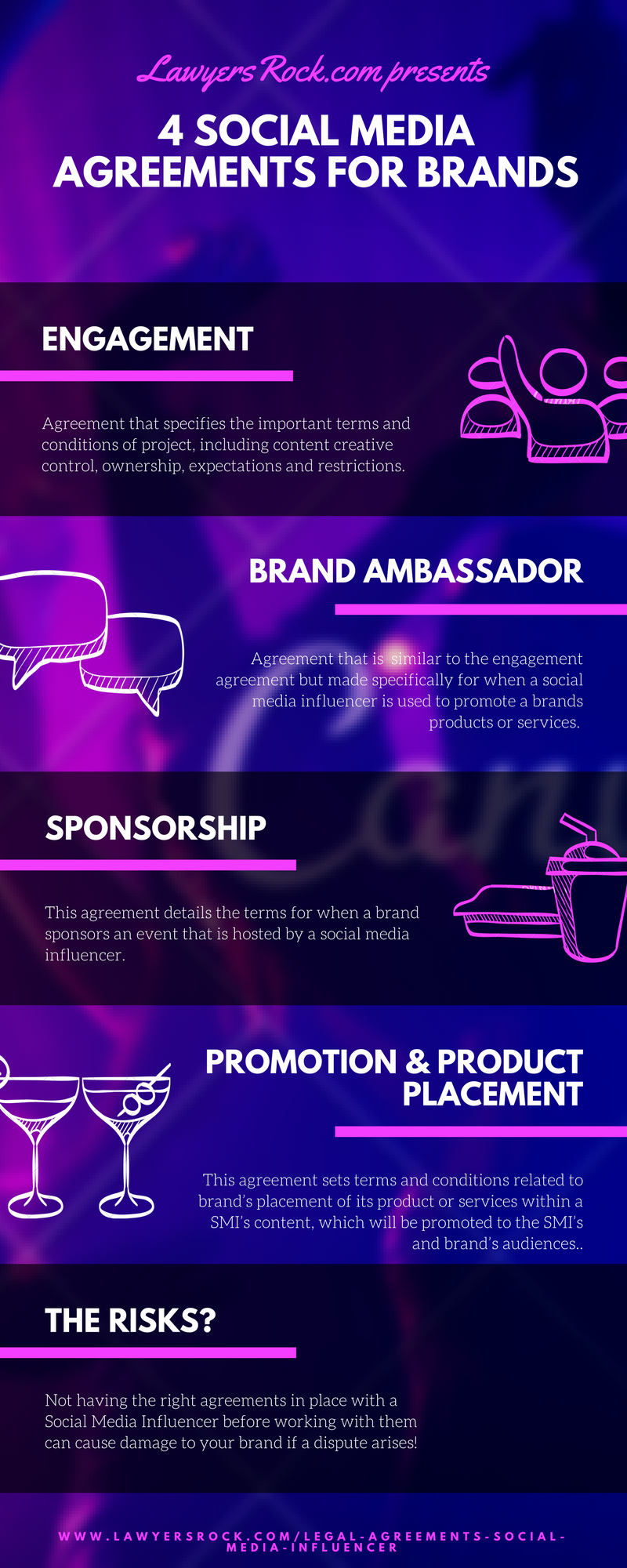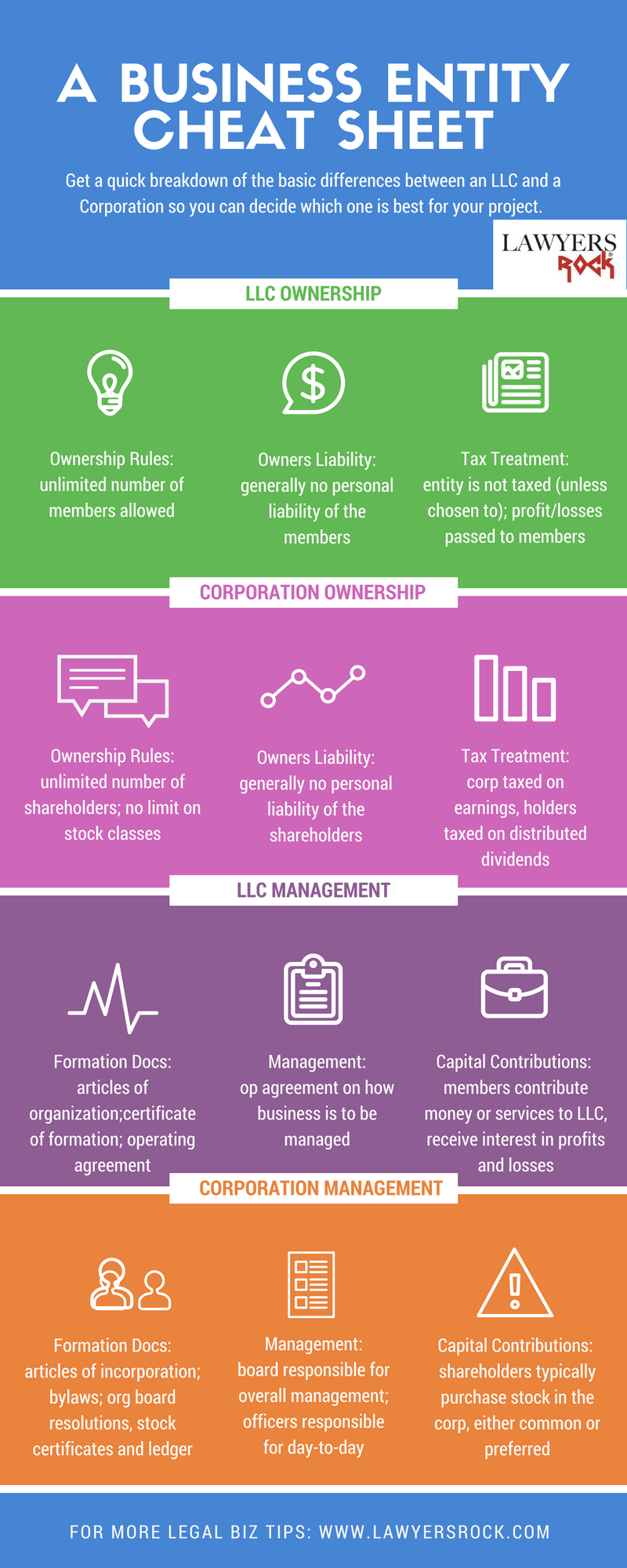
The landscape of the digital world with respect to promoting brands, products, and services is constantly evolving. The early years where “anything goes” are now long gone as more laws have taken effect.
Activities that were completely acceptable a few years ago are now being regulated (even though many people try to ignore these regulations).
For example, remember when you could pay a bunch of celebs to freely post a promotion on their Myspace pages (took you back, huh)?
Well, nowadays the FTC requires individuals to disclose paid endorsements or face steep fines.
It is important for companies to comply with the changing laws, but it is just as critical for companies to translate the legal safeguards that it applies to traditional advertising, marketing, and promotional activities, to its digital campaigns.
So if a company or brand would instinctively enter into a solid agreement with a traditional marketing person, why is engaging a social media influencer (SMI) any different?
The answer is…there is no difference. Yet, in my experience, it seems like some traditional company owners still think that using social media is merely an informal pet project with no consequences. This is completely wrong.
Instead of going into a boring summary of each area of law that is involved with engaging an SMI, let’s break it all down with a real life example (the culprits shall remain nameless).
Here we go!
Brand A sells women’s hair spray. Brand A finds the perfect SMI on YouTube. The SMI’s audience fits the demographics of Brand A’s hair spray perfectly and she has well over 10 Million faithful subscribers.
Brand A reaches out to SMI and they do a loose agreement over email with some basic terms. Things go well for a month and Brand A can see a direct correlation in sales and its appearances in SMI’s videos.
Brand A has also cross promoted SMI and she now has subscribers that have migrated from Brand A’s social media.
In the second month of the Brand A-SMI relationship, Brand B (Brand A’s competitor), which sells hair gel, notices Brand A’s success and reaches out to SMI to see if she will promote its product for a generous fee. SMI says, “sure” and her next video contains both Brand A’s hair spray and Brand B’s hair gel.
Brand A is furious and, in so many words, tells SMI “You Can’t Do That!”, and demands that she stop promoting Brand B. SMI becomes irate and tells Brand A “I don’t have any restrictions on my life…go suck on your hair spray and leave me alone!”, and she not only refuses to promote Brand A anymore, but she also says some unflattering things about Brand A’s hairspray to her audience.
In addition, Brand A continues to promote its hairspray using SMI’s videos that feature the product without her consent.
Ultimately, they all get their lawyers involved and what happens?
Brand A alleged breach of contract, defamation, trade disparagement, tortious interference with prospective contractual relationships, and unfair competition…I could go on.
SMI alleged copyright and trademark infringement for the continued unauthorized use of her videos, which include her trademarked name and logos, and she alleges unauthorized commercial appropriation because Brand A continues to use her name, likeness, voice, etc.
Brand B demanded its money back because of the distraction.
Who won? No one. They all wasted their money fighting each other merely because they did not have a clear understanding of the relationship up front.
My point is that engaging a SMI to elevate a company’s brand, product or service is an important relationship that needs to be clearly defined. It involves many legal issues, such as contractual obligations, intellectual property rights, and right of publicity law.
Don’t be a Brand A, Brand B, or SMI in this example!
Side Note:
If you need legal agreements for a deal with a Social Media Influencer I put together this affordable package of Social Media Influencer Templates exclusively for my Blog readers!
This Infograph is a quick summary of the important points in this article.
Below that is a full article on the 4 key Social Media Influencer Agreements with more details.
Infograph: 4 Social Media Influencer Agreements

Want to share this image on your site? Just copy and paste the embed code below:
The following are four essential agreements that companies, brands (and SMIs) should have in their toolbox before initiating a campaign:
-
ENGAGEMENT AGREEMENT
The most important agreement that a company or brand will make with a SMI is the Engagement Agreement. This agreement should be carefully customized to fit the specific situation.
First, it is important to note that the agreement itself does not dictate whether a SMI is classified as an employee or an independent contractor.
Just because you call someone an independent contractor does not mean that the law considers them one. This classification depends on many factors, including the treatment of the person and the amount of control that the worker has over their work.
Some other key points to consider include:
- Who Will Dictate Creative Control of Content? If content (i.e., videos, pictures, copy) is being created, who creates or selects it? Will there be minimum requirements for the appearance of trademarks, mentions of the brand’s name, tracking links, and/or promo codes? Will the brand provide copy points that the SMI puts in his or her own words?
- Who Will Own The Content? Does the brand’s payment to the SMI include a buyout of all rights to specially created content, or is payment intended to merely to secure a license for the brand to use the content? If it is the latter, is that license exclusive or non-exclusive? Is there a holdback period (i.e., Is there an exclusivity period or, to a lesser extent, a period or place where the influencer cannot post the content)?
- Is There An Approval Process? Will there be pre-approved posts (i.e., photos, topics) or does every post need to be approved beforehand?
- What Does Each Party Expect? What are both parties expectations with regards to message, deliverables, campaign and posting schedules, platforms, accounts/channels within certain platforms, etc.?
- Are There Competitor Restrictions? Who is SMI restricted from entering into an agreement with or mentioning (i.e., direct competitors) during the contract period;
And, of course, payment structure and schedule should be determined.
Some of the points above may also apply to the agreements below.
BRAND AMBASSADOR AGREEMENT
This is a specific type of engagement agreement for when a brand uses a SMI to endorse and promote the brand, or its products/services using his or her social media influence.
The scope of this agreement is limited and the relationship is more likely considered that of an independent contractor.
As noted above, control over content, ownership, approval requirements, party expectations, and competitor restrictions are important to work out.
-
SPONSORSHIP AGREEMENT
This is an agreement that should be put in place when a brand sponsors an event that is hosted by a SMI. From the brand’s perspective, the most important point is whether the relationship is exclusive, exclusive within a certain industry, or non-exclusive. An exclusive sponsor means that no other brand names are mentioned in promotions or during the sponsored activity.
Usually the sponsoring brand pays a large fee to secure this right. Exclusivity by industry means that the SMI is allowed to have other sponsors in industries that are unrelated to the brand’s industry. So, if the main sponsoring brand is an apparel company, then the SMI is allowed to secure a beverage sponsor.
A non-exclusive sponsorship means that there are no restrictions on the SMI to engage other sponsors, even with competitors. This is usually the case where the sponsors pay a low fee or just provide product for the event.
Other typical points in sponsorship agreements include defining the use of trademarks, payment and product display specifications, and the parties promotional obligations, such as social media campaigns and other cross promotional activities.
-
Promotion and Product Placement Agreement
This is an agreement that sets forth the terms and conditions related to a brand’s placement of its product or services within a SMI’s content (i.e., video), which will be promoted to the SMI’s and brand’s audiences.
Other points that need to be specified in this agreement include the exclusivity issue discussed above and the specify visibility of trademarks and products.
For example, a brand will want to know how many close up shots it will get in the content so that their trademark is clear.
What’s the risk of NOT having the right agreement in place?
The risks are obvious once you understand the potential issues. For example, what if you don’t have a non-disparagement clause in your agreement (a clause that says that the SMI cannot bad mouth the company or brand) and a dispute arises. Can you imagine the damage to your brand if the SMI goes on a rant on their platform?
Remember, you purposely sought out the SMI because of their amazing following!
If you can’t afford to hire an attorney to draft these agreements for you (which is always my first recommendation), we offer an affordable and proven package of Social Media Influencer Agreement Templates that you can check out!
The agreements are drafted from the perspective of looking out for the company or brand, but they could also be helpful for a Social Media Influencer so that he or she can see the issues.
Until next time!
 Regardless of the industry, when starting a new business, project, brand, or venture, the first step is to determine the proper legal structure. This typically becomes a choice between a corporation or a limited liability company.
Regardless of the industry, when starting a new business, project, brand, or venture, the first step is to determine the proper legal structure. This typically becomes a choice between a corporation or a limited liability company.




